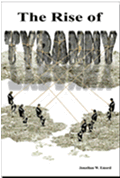ABRAHAM LINCOLN: POET AND LOVER OF POETRY
By
Attorney Jonathan Emord
February 22, 2010
NewsWithViews.com
The genius and poeticism of Abraham Lincoln are clear from his formal writings and speeches as well as his informal correspondence. Many have written concerning his obsessive reflections upon death. Indeed, he was surrounded by it his entire life, from the loss of siblings, to the loss of his parents, to the loss of his two sons Edward (Eddie) Baker Lincoln at age 4 from pulmonary tuberculosis and William (Willie) Wallace Lincoln at age 11 to typhoid fever, to the deaths of dear friends and acquaintances throughout the civil war. He seems to have absorbed the horrors, to have become plaintive and then reflective about them, and then to have done something more—to have made peace with death and to have anticipated the after life beyond the veil.
He was preoccupied with the intimate details of battle and many times expressed profoundly spiritual emotions in addressing human losses, including his monumental work of but 272 words that stirs all hearts eternally, the Gettysburg Address. The King James version of the Bible he committed largely to memory and interlaced his speeches, debates, and correspondence with biblical terms.
Throughout his life Lincoln wrote poetry. It flowed from him. Even as a teen he scrawled short poems in his arithmetic book. Witty and silly, they nonetheless reveal that even as a young boy he possessed an active mind and sense of humor:
Abraham
Lincoln
His hand and pen
He will be good but
God knows when.
And:
Abraham
Lincoln is my name
And with my pen I wrote the same
I wrote in both hast and speed
And left it here for fools to read
Among
his favorite poets was the Scotsman Robert Burns. But his favorite poem
was one by a more obscure Scotsman William Knox entitled “Oh!
Why Should the Spirit of Mortal be Proud.” That poem reminds us
of the brevity of life, of its necessary humility, as we merge into
an eternal sea of humanity ebbing and flowing. It depicts man, try as
he might, to be even when greatest but a Lilliputian swept away ultimately
by the generations. “I would give all I am worth, and go in debt,
to be able to write so fine a piece as I think that is,” wrote
Lincoln of Knox’s poem. Lincoln committed it to memory and appears
not to have known Knox to be the author until late in life.
Here is the poem in its entirety excerpted from One Hundred Choice Selections
(Phineas Garrett, editor) (1897):
Oh!
why should the spirit of mortal be proud?
Like a swift-fleeting meteor, a fast-flying cloud,
A flash of the lightning, a break of the wave,
Man passeth from life to his rest in the grave.
The leaves of the oak and the willow shall fade,
Be scattered around, and together be laid;
And the young and the old, and the low and the high
Shall molder to dust and together shall lie.
The infant a mother attended and loved;
The mother that infant's affection who proved;
The husband that mother and infant who blessed,--
Each, all, are away to their dwellings of rest.
The maid on whose cheek, on whose brow, in whose eye,
Shone beauty and pleasure,--her triumphs are by;
And the memory of those who loved her and praised
Are alike from the minds of the living erased.
The hand of the king that the sceptre hath borne;
The brow of the priest that the mitre hath worn;
The eye of the sage, and the heart of the brave,
Are hidden and lost in the depth of the grave.
The peasant whose lot was to sow and to reap;
The herdsman who climbed with his goats up the steep;
The beggar who wandered in search of his bread,
Have faded away like the grass that we tread.
The
saint who enjoyed the communion of heaven;
The sinner who dared to remain unforgiven;
The wise and the foolish, the guilty and just,
Have quietly mingled their bones in the dust.
So the multitude goes, like the flowers or the weed
That withers away to let others succeed;
So the multitude comes, even those we behold,
To repeat every tale that has often been told.
For we are the same our fathers have been;
We see the same sights our fathers have seen;
We drink the same stream, and view the same sun,
And run the same course our fathers have run.
The thoughts we are thinking our fathers would think;
From the death we are shrinking our fathers would shrink;
To the life we are clinging they also would cling;
But it speeds for us all, like a bird on the wing.
They loved, but the story we cannot unfold;
They scorned, but the heart of the haughty is cold;
They grieved, but no wail from their slumbers will come;
They joyed, but the tongue of their gladness is dumb.
They died, aye! they died; and we things that are now,
Who walk on the turf that lies over their brow,
Who make in their dwelling a transient abode,
Meet the things that they met on their pilgrimage road.
Yea! hope and despondency, pleasure and pain,
We mingle together in sunshine and rain;
And the smiles and the tears, the song and the dirge,
Still follow each other, like surge upon surge.
'Tis the wink of an eye, 'tis the draught of a breath,
From the blossom of health to the paleness of death,
From the gilded saloon to the bier and the shroud,--
Oh! why should the spirit of mortal be proud?
In great men we often see the hand of Providence. Lincoln rose from poverty and isolation to become the indispensable figure to prosecute and win the only war we have waged with ourselves, the bloodiest conflict of our history. He lived in a time of medical infancy with disease and death always lurking. He appears to have suffered from melancholy, bouts of depression, throughout his adult life. His own poetry upon entering middle age in reflection on lost youth and death in “My Childhood’s Home I see Again” (1847), following a visit to his childhood romps in Indiana, is in line with Knox’s poem, reflecting on a lost past and on life swallowed up by death. Here are a few choice lines of the first canto:
Near
twenty years have passed away
Since here I bid farewell
To woods and fields, and scenes of play,
And playmates loved so well.
Where many were, but few remain
Of old familiar things;
But seeing them, to mind again
The lost and absent brings.
The friends I left that parting day,
How changed, as time has sped!
Young childhood grown, strong manhood gray,
And half of all are dead.
I hear the loved survivors tell
How nought from death could save,
Till every sound appears a knell,
And every spot a grave.
I range the fields with pensive tread,
And pace the hollow rooms,
And feel (companion of the dead)
I'm living in the tombs.
Although Lincoln appears to have spent much of his life preoccupied with death and convinced that it not only humbled man but erased him, he appears among the few who have achieved an imortality recognizable to mortals. His life is in this respect ironic. The contributions of the man to preservation of the union, to the destruction of the institution of slavery, and to rhetoric have made him live beyond death in so many ways.
| Subscribe to the NewsWithViews Daily News Alerts! |
His own death has shocked the conscience of the world then as now and also causes, together with his other monumental achievements, generation after generation to study him. His own enigmatic ways likewise inspire serious inquiry with book after book endeavoring to define the “real” Lincoln. So while human life often recedes into the memory of future generations (as Lincoln believed), Lincoln’s own life remains in the forefront of many modern thinkers and likely will always hold that special place.
� 2010 Jonathan W. Emord - All Rights Reserved
















